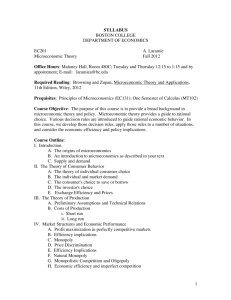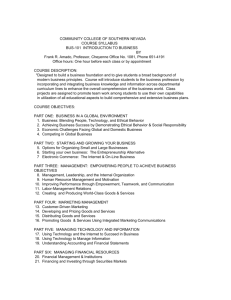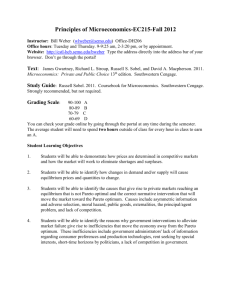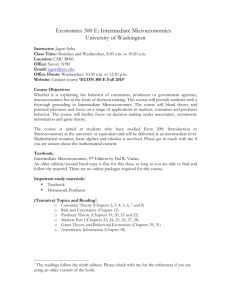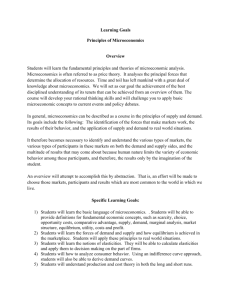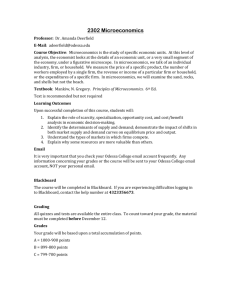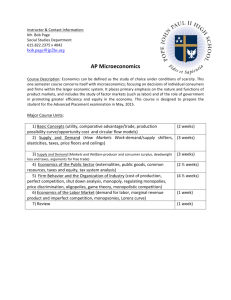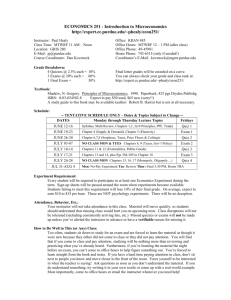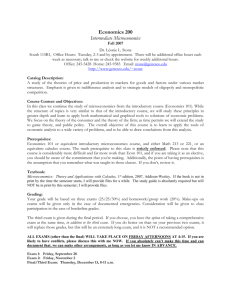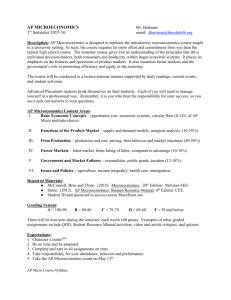PRINCIPLES AND APPLICATION OF MICROECONOMICS 11:3
advertisement
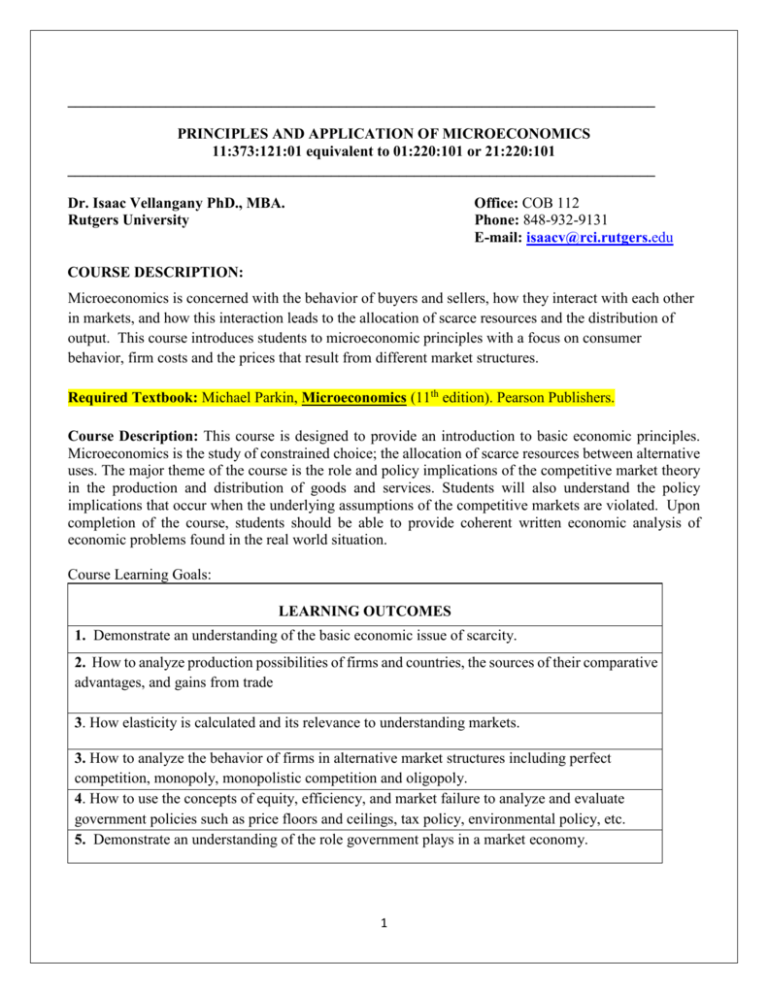
______________________________________________________________________________ PRINCIPLES AND APPLICATION OF MICROECONOMICS 11:373:121:01 equivalent to 01:220:101 or 21:220:101 ______________________________________________________________________________ Dr. Isaac Vellangany PhD., MBA. Rutgers University Office: COB 112 Phone: 848-932-9131 E-mail: isaacv@rci.rutgers.edu COURSE DESCRIPTION: Microeconomics is concerned with the behavior of buyers and sellers, how they interact with each other in markets, and how this interaction leads to the allocation of scarce resources and the distribution of output. This course introduces students to microeconomic principles with a focus on consumer behavior, firm costs and the prices that result from different market structures. Required Textbook: Michael Parkin, Microeconomics (11th edition). Pearson Publishers. Course Description: This course is designed to provide an introduction to basic economic principles. Microeconomics is the study of constrained choice; the allocation of scarce resources between alternative uses. The major theme of the course is the role and policy implications of the competitive market theory in the production and distribution of goods and services. Students will also understand the policy implications that occur when the underlying assumptions of the competitive markets are violated. Upon completion of the course, students should be able to provide coherent written economic analysis of economic problems found in the real world situation. Course Learning Goals: LEARNING OUTCOMES 1. Demonstrate an understanding of the basic economic issue of scarcity. 2. How to analyze production possibilities of firms and countries, the sources of their comparative advantages, and gains from trade 3. How elasticity is calculated and its relevance to understanding markets. 3. How to analyze the behavior of firms in alternative market structures including perfect competition, monopoly, monopolistic competition and oligopoly. 4. How to use the concepts of equity, efficiency, and market failure to analyze and evaluate government policies such as price floors and ceilings, tax policy, environmental policy, etc. 5. Demonstrate an understanding of the role government plays in a market economy. 1 Academic Integrity: Standards of academic conduct are set forth in the University’s Academic Integrity Code. By registering, you have acknowledged your awareness of the Academic Integrity Code, and you are obliged to become familiar with your rights and responsibilities as defined by the Code. Please see me if you have any questions about the academic violations described in the Code, which is available online at: Policy on Academic Integrity -- Rutgers Grading: There will be four tests during the semester: Each test is worth 20 - 25% and 10% will be awarded for homework assignments, attendance and participation. I do not take regular attendance, but sign in sheets will be circulated at a regular interval. Make up quiz will only be given in the case of a welldocumented emergency. If you miss one of the quizzes with a legitimate reason told to and approved by the instructor in advance, then your will have the opportunity to make up the missed quiz within a week after. Please do not make any travel arrangements that conflict with your final exam schedule. Assignment topics will be given in the class. Any assignment submitted after the deadline will not be evaluated for any credit. Attendance: You are required to attend classes regularly. All homework assignment will be given in the class. You are responsible to get the assignment from others if you are absent on that day. Use university absent reporting system if you are unable to attend the class. Do not email the reasons for your absence. A student may be absent without penalty for 10% of the number of scheduled class meetings during the semester as follows: Allowable Absence if class meets: 1 time/week -2 classes, 2 times/week - 3 classes 3 times/week - 4 classes. For this class, if you miss more than 3 classes, you are likely to lose 5% of the grade. Quiz Dates Quiz/Date Test 1 Test 2 Test 3 Test 4 Homework assignment Attendance, participation Total Grading Scale: A = 90 % and above C+ = 75%-79% F = 60%and below Possible points 100 100 100 100 100 100 600 Percentage weight 20 20 25 25 05 05 100 B+ = 85%-89% C = 70%-74% B = 80%-84% D= 61%-69% Email: Please do not enquire your grade via email. It is the university policy that under no circumstances instructors are permitted to transmit grade via email. All your midterm grades will be made available in the class and on Sakai and the final course grade will be posted on the Rutgers web site within 48 hours after the final exam. When I make announcement in the class, the same information will be posted in Sakai and if you ask for the same information via email, sorry, I will not respond. 2 Lecture Topics: I reserve the right to alter this syllabus during the course of this semester Chapter 1. What is Economics? Chapter 2. The Economic Problem Chapter 3 Demand and Supply Chapter 4 Elasticity Test 1: covers chapters 1 – 4 Chapter 5 Efficiency and Equity Chapter 6 Government Actions in Markets Chapter 8 Utility and Demand Chapter 9 Possibilities, Preferences, and Choices Test 2: covers chapters 5, 6, 8and 9 1 9 19 29 37 49 69 79 Chapter 10 Organizing Production Chapter 11 Output and Costs Chapter 12 Perfect Competition Chapter 13 Monopoly Test 3: covers chapters 10 -13 87 95 105 115 Chapter 14 Monopolistic Competition Chapter 15 Oligopoly Chapter 16 Public Choices and Public Goods Addition chapter if time permits Test 4: chapters 8 -16 125 131 139 3
